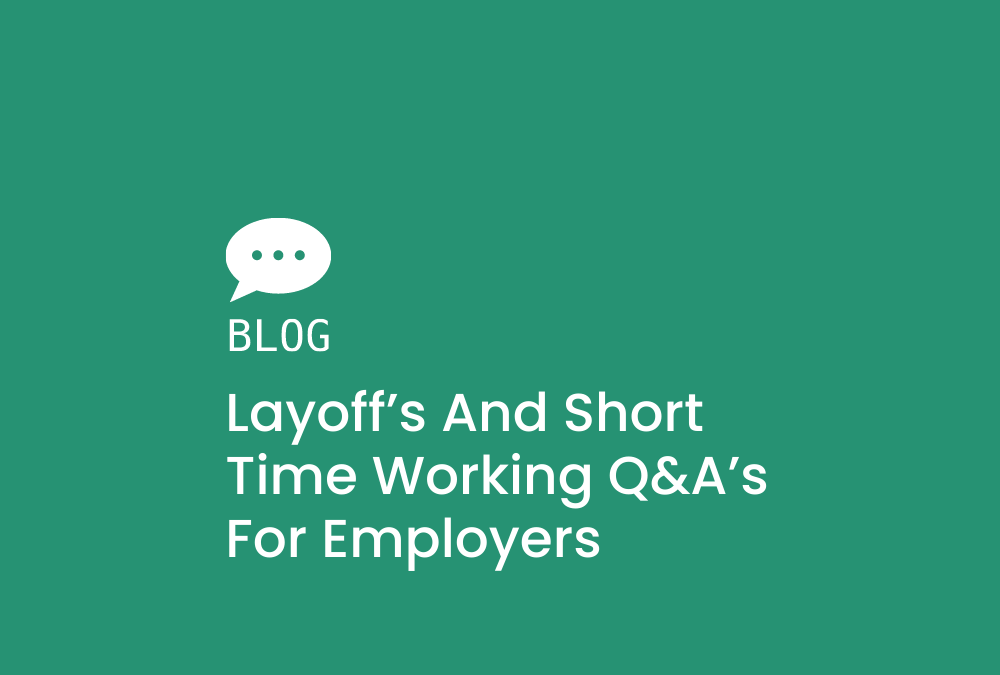What is short-time working and layoff?
Both are mechanisms for companies try to find alternative ways to reduce costs in the current climate of uncertainty without permanently losing skilled staff through redundancy.
Laying off is where employees are retained for a period but provided with no work.
Short time working is where employees are retained for a period on half pay or less.
The statutory definition for an employee being put on short-time working for a week is where:
- By reason of a diminution in the work provided for the employee by the employer (being work of a kind which under the contract of employment the employee is employed to do).
- The employee’s remuneration for the week is less than half a week’s pay.
(Section 147(2), ERA 1996.) http://www.legislation.gov.uk/ukpga/1996/18/section/147
Can I just put my staff on short-time working or layoff?
You do not automatically have the right to lay staff off or reduce their hours just because there is less work. There will likely be no issue for an employee with no guaranteed hours or pay, working under a casual or zero-hours contract, as such a contract does not guarantee a certain level of income. However, where an employee is engaged on a fixed salary or weekly wage you will remain liable to pay the employee unless there is either an implied right (usually through custom and practice) or express wording in the contract permitting lay-off or short-time working.
What if I just put them on short-time working or layoff off without their agreement?
If you lay off an employee or put them on short-time working in the absence of an express or implied contractual right to do so, you will be in fundamental breach of contract entitling the employee to resign and claim constructive dismissal.
The Acas guide Lay-offs and short-time working makes clear that where an employer lays employees off or puts them on short-time working, without the contractual right to do so, an employee’s options are:
- choose to accept the breach of contract and treat the contract as continuing, while claiming a statutory guarantee payment (SGP)*.
- sue for damages for breach of contract in the civil court or, in certain circumstances, at an employment tribunal.
- claim before an employment tribunal that there has been an unlawful deduction of wages under Part II of the ERA 1996.
- claim that the employer’s action amounted to a dismissal (constructive or otherwise), giving rise to potential claims for unfair dismissal and/or redundancy pay.
If the employee decides to resign and claim constructive dismissal and the reason for dismissal is redundancy, the employee may also claim a statutory redundancy payment.
* Click HERE to see to the government website setting out Guarantee Pay (SGP). SGP is limited to five days in any period of three months for a full-time employee, or pro rata for an employee who works fewer than five days a week. The maximum an employee can be paid is £29 a day for 5 days in any 3-month period – so a maximum of £145.
How long can I lay off staff or have them on short time working?
In some circumstances, employees who are laid off or put on short-time working (or a combination of the two) for four consecutive weeks, or a total of six weeks in any 13, have a right to terminate their employment and claim a statutory redundancy payment. For these purposes, an employee is laid off during any week where you provide no work and you are not obliged under the contract to give any pay (apart from SGP); short-time working means that the employee’s hours are reduced due to a diminution in their work, such that their pay during that week (not counting any SGP) is less than half a week’s pay (uncapped).
What other option do I have if I don’t have a contractual or implied right (custom and practice) to exercise lay off or short time working?
An alternative proposal could be something similar to the following. With employees’ mutual consent in writing, your staff agree to accept to work a three-day week. Employees would work 60% of their current working hours and be paid pro rata accordingly.
For you to be able to implement a 3-day week you need staff to volunteer to accept a temporary change to their contracts. This will include amendments to pension contributions, maternity and a pro rata of any other benefits or allowances.
You need to make clear that you are planning this temporary change, for example, for 12 weeks to prevent the business needing to close but will be reviewing the situation on a daily basis. You need to make clear that every staff member is being asked to do the same.
20th March 2020
For employment law advice relating to COVID-19, please get in contact with one of our fully qualified and experienced Employment Law Solicitors in Leeds.

